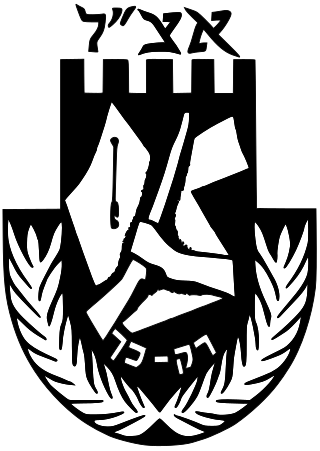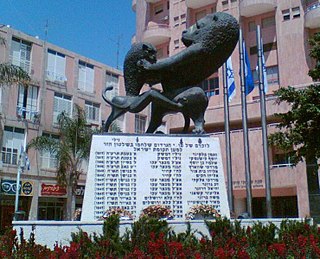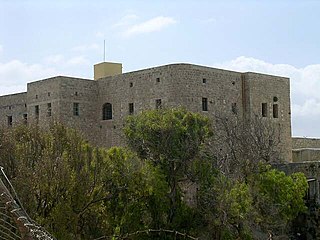| 1947 in the British Mandate of Palestine | ||||
»»» | ||||
| ||||
Events in the year 1947 in the British Mandate of Palestine .
| 1947 in the British Mandate of Palestine | ||||
»»» | ||||
| ||||
Events in the year 1947 in the British Mandate of Palestine .
| | This section needs expansion. You can help by adding to it. (August 2010) |



The Irgun, or Etzel, was a Zionist paramilitary organization that operated in Mandatory Palestine between 1931 and 1948. It was an offshoot of the older and larger Jewish paramilitary organization Haganah. The Irgun has been viewed as a terrorist organization or organization which carried out terrorist acts.

Zionist political violence refers to acts of violence or terrorism committed by Zionists in support of establishing and maintaining a Jewish state in Palestine. These actions have been carried out by individuals, paramilitary groups, and the Israeli government, from the early 20th century to the present day, as part of the ongoing Israeli-Palestinian conflict.

Lehi, often known pejoratively as the Stern Gang, was a Zionist paramilitary militant organization founded by Avraham ("Yair") Stern in Mandatory Palestine. Its avowed aim was to evict the British authorities from Palestine by use of violence, allowing unrestricted immigration of Jews and the formation of a Jewish state. It was initially called the National Military Organization in Israel, upon being founded in August 1940, but was renamed Lehi one month later. The group referred to its members as terrorists and admitted to having carried out acts of terrorism.
Haganah was the main Zionist paramilitary organization that operated for the Yishuv in the British Mandate for Palestine. It was founded in 1920 to defend the Yishuv's presence in the region, and was formally disbanded in 1948, when it became the core force integrated into the Israel Defense Forces shortly after the Israeli Declaration of Independence.

Operation Agatha, sometimes called Black Sabbath or Black Saturday because it began on the Jewish sabbath, was a police and military operation conducted by the British authorities in Mandatory Palestine. Soldiers and police searched for arms and made arrests in Jerusalem, Tel Aviv, Haifa and several dozen settlements; the Jewish Agency was raided. The total number of British security forces involved is variously reported as 10,000, 17,000, and 25,000. About 2,700 individuals were arrested, among them future Israeli Prime Minister Moshe Sharett. The officially given purpose of the operation was to end "the state of anarchy" then existing in Palestine. Other objectives included obtaining documentary proof of Jewish Agency approval of sabotage operations by the Palmach and of an alliance between the Haganah and the more violent Lehi and Irgun, destroying the Haganah's military power, boosting army morale and preventing a coup d'état being mounted by the Lehi and Irgun.

The Palmach was the elite combined strike forces and sayeret unit of the Haganah, the underground army of the Yishuv during the period of the British Mandate for Palestine. The Palmach was established in May 1941. By the outbreak of the 1948 Arab–Israeli War, it consisted of over 2,000 men and women in three fighting brigades and auxiliary aerial, naval and intelligence units. With the creation of Israel's army, the three Palmach Brigades were disbanded. This and political reasons compelled many of the senior Palmach officers to resign in 1950.

Shlomo Ben-Yosef was a member of the Revisionist Zionist underground group Irgun. He is most noted for his participation in an April 21, 1938, attack on a bus carrying Arab civilians, intended as a retaliation for an earlier attack by Arabs against Jews, and emblematic as a rejection of the establishment policy of Havlagah, or restraint. For this reason, and especially for having been the first Jew executed by the British authorities during the mandate period, Ben-Yosef became a martyr for the Revisionist cause and is commemorated by the State of Israel as one of 12 Olei Hagardom.

Olei Hagardom refers to members of the two Jewish Revisionist pre-state underground organisations Irgun and Lehi, most of whom were tried in British Mandate military courts and sentenced to death by hanging. Most of the executions were carried out at Acre Prison. There were 12 Olei Hagardom.

The 1947–1948 civil war in Mandatory Palestine was the first phase of the 1947–1949 Palestine war. It broke out after the General Assembly of the United Nations adopted a resolution on 29 November 1947 recommending the adoption of the Partition Plan for Palestine.

The Sergeants affair was an incident that took place in Mandate Palestine in July 1947 during Jewish insurgency in Palestine, in which the Jewish underground group Irgun kidnapped two British Army Intelligence Corps NCOs, Sergeant Clifford Martin and Sergeant Mervyn Paice, and threatened to hang them if the death sentences passed on three Irgun militants—Avshalom Haviv, Meir Nakar, and Yaakov Weiss—were carried out. The three had been captured by the British during the Acre Prison break, tried, and convicted on charges of illegal possession of arms, and with 'intent to kill or cause other harm to a large number of people'. When the three men were executed by hanging, the Irgun killed the two sergeants and hung their booby-trapped bodies in a eucalyptus grove near Netanya.

The Acre Prison break was an operation undertaken by the Irgun on May 4, 1947, in the British Mandate of Palestine, in which its men broke through the walls of the Central Prison in Acre and freed 27 incarcerated Irgun and Lehi members.

A successful paramilitary campaign, sometimes referred to as the Palestine Emergency, was carried out by Zionist underground groups against British rule in Mandatory Palestine from 1944 to 1948. The tensions between the Zionist underground and the British mandatory authorities rose from 1938 and intensified with the publication of the White Paper of 1939. The Paper outlined new government policies to place further restrictions on Jewish immigration and land purchases, and declared the intention of giving independence to Palestine, with an Arab majority, within ten years. Though World War II brought relative calm, tensions again escalated into an armed struggle towards the end of the war, when it became clear that the Axis powers were close to defeat.

Acre Prison, also known as Akko Prison, is a former prison and current museum in Acre, Israel.
Operation Hametz was a Zionist operation towards the end of Mandatory Palestine, as part of the 1948 Palestine war. It was launched at the end of April 1948 with the objective of capturing villages inland from Jaffa and establishing a blockade around the town. The operation, which led to the first direct battle between the British and the Irgun, was seen as a great victory for the latter, and enabled the Irgun to take credit for the complete conquest of Jaffa that happened on May 13.

Yehoshua Zettler was an Israeli who served as the Jerusalem commander of the Jewish paramilitary group Lehi, often called the Stern Gang. He conceived and planned the September 17, 1948, assassination of Swedish Count Folke Bernadotte, who was representing the United Nations Security Council as a mediator in the aftermath of the 1948 Arab–Israeli War.

Events in the year 1948 in the British Mandate of Palestine.
This is a timeline of intercommunal conflict in Mandatory Palestine.

The United Nations Special Committee on Palestine (UNSCOP) was created on 15 May 1947 in response to a United Kingdom government request that the General Assembly "make recommendations under article 10 of the Charter, concerning the future government of Palestine". The British government had also recommended the establishment of a special committee to prepare a report for the General Assembly. The General Assembly adopted the recommendation to set up the UNSCOP to investigate the cause of the conflict in Palestine, and, if possible, devise a solution. UNSCOP was made up of representatives of 11 countries. UNSCOP visited Palestine and gathered testimony from Zionist organisations in Palestine and in the US. The Arab Higher Committee boycotted the commission, explaining that the Palestinian Arabs' natural rights were self-evident and could not continue to be subject to investigation, but rather deserved to be recognized on the basis of the principles of the United Nations Charter.